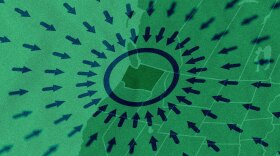One of the world's best-known thinkers about global climate change is Australian writer Tim Flannery. He's not only a best-selling author, he's also his country's first Chief Commissioner for Climate Change.
His latest book, Here on Earth: a Natural History of the Planet, paints a hopeful picture of the future of human life on earth. He recently gave a talk in Seattle, where he said his message of optimism seemed to have trouble getting through to his audience.
KPLU's Bellamy Pailthorp caught up with him for an interview.
KPLU: You’ve been touring the country with your new book “Here on Earth." In a nutshell, what is the book about?
Flannery: The book really is a twin biography of our planet and our species, and it came about because people kept asking me questions about what our future was. Do we have a chance of dealing with the climate problem? Are we going to crash and burn because of our environmental issues? And the only way I could think of answering that question was to go back to the basics. You know, ask about the old system: how it works ... what sort of creatures we are.
KPLU: One of your chief intellectual sparring partners is Peter Ward, a professor at the University of Washington. In your latest book, you discuss his theory of the “Medea Hypothesis." (Medea was a mythological female creature that ate her young.)
Flannery: That’s right. And Peter’s work is just outstanding, I should say. He’s a great friend. But the Medea Hypothesis he’s developed is quite an abysmal one. He argues that it's life that destroys life, you know, because as life becomes ever more successful it upsets the balance on the planet and therefore, of course, extinction. He would see that what humans are doing right now is just part of that great pattern. I’m not sure it’s as simple as that. I think that in fact, we are seeing the potential for humans to start working together and act as sort of a global intelligence, if you want, for the planet. We are having success even though it’s too slow. We’re having success dealing with the great problems we face whether, be it the destruction of the ozone layer or green house gases causing climate change; or whether it be just toxic chemicals like the persistent organic pollutants recently banned. So, I hope Peter is wrong. I hope my argument is a bit better, but what I would hate to see people do is just jump from ignorance about our environmental problems to despair because that’s the lazy person’s way of dealing with it. It actually takes a lot of effort and energy to deal with these problems, and that’s what we need right now if we hope to secure our future.
KPLU: Anything you want to share about the Seattle audience you read to at Seattle’s Town Hall?
Flannery: I found that the argument of hope was almost painful for people there, I think. ... With the rise of the Republicans in congress and their denial of climate science, perhaps they’re inclined to despair. And we’ve got to encourage people not to do that. (They need) to recognize the gains we’re making and to acknowledge that this is really hard work and that there will be steps backwards as well as steps forward. But I found that the people in Seattle, you know, one of the most progressive cities in country, were feeling worn down. And I just said to them, try to win and try, yourself, again. We are actually doing some good things.
http://www.youtube.com/watch?v=LO-sggS5-L4







